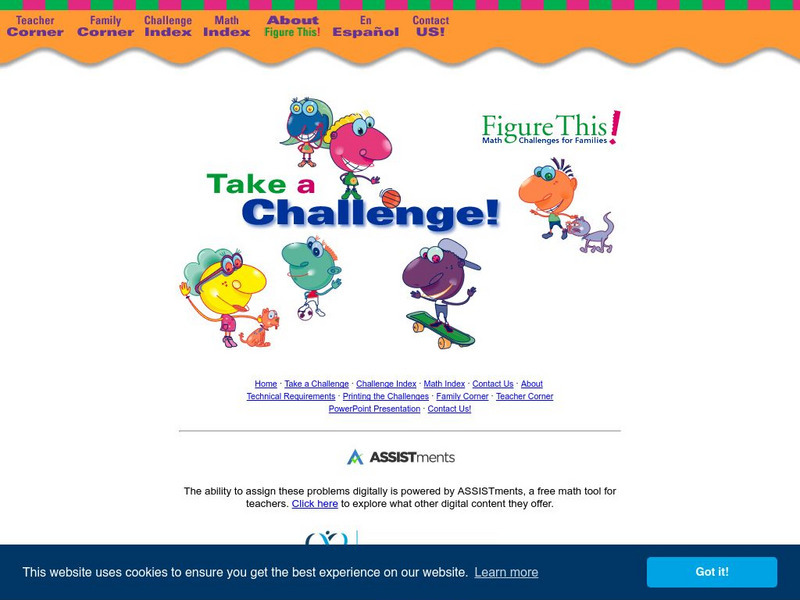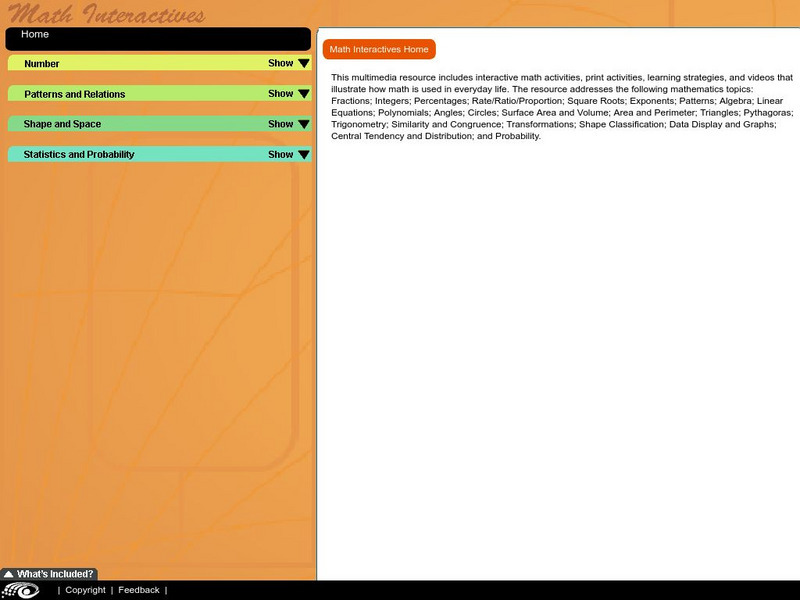Hi, what do you want to do?
Curated OER
Surface Area of Rectagular Prisms
Sixth graders investigate the area of polygons. In this geometry lesson, 6th graders calculate area of prisms using geometric formulas. They work with prisms and other rectangular shapes.
Curated OER
Cross Sections
Young visual learners explore different cross sections of 3-dimensional objects. First, cross sections of cubes are explored by using an interactive flash activity. This is then extended by looking at cross sections of spheres,...
Curated OER
Net (Triangular Prism)
In this net worksheet, students use the pattern to create a triangular prism. Students cut out the pattern and fold on the dotted lines and paste it to make the solid figure.
Curated OER
Marshmallow Figures
Students enjoy making 3-D figures while learning about rectangular prisms, pyramids, vertices, edges, and faces. After a lecture/demo, students use marshmallows, toothpicks and a worksheet imbedded in this instructional activity to...
Curated OER
Supplementary, Complementary, and Vertical Angles
By using circles that they cut out and label themselves, learners literally "get a grip" on the angles they identify: supplementary, complementary, and vertical. They solve missing measurements based on properties of supplementary,...
Curated OER
Measurement
Middle schoolers create two prisms out of the same paper. They calcuate the number of centimeter cubes needed to fill each prism. They discover the concept of volume.
Curated OER
The X-33 and the X-38
Students explore the relationships among the lengths, areas, and volumes of similar solids. They also discover what effect doubling the dimensions of a figure has on the resulting area.
Curated OER
Three-Dimensional Figures
Sixth graders explore three-dimensional objects. Using various objects found in the classroom, they identify faces, edges, and vertices of objects. Students create their own objects. They describe the polydron, telling the faces,...
Curated OER
A World of Symmetry
Middle schoolers identify lines of symmetry. In this symmetry lesson, students create objects and identify their lines of symmetry. They answer questions about lines of symmetry. Middle schoolers cut shapes out of...
Curated OER
Polygons and Plane Figures
Young scholars choose a polygon to define and describe, and use Power Point and the Internet to present their polygon.
Curated OER
Classify Prisms
Students classify prisms according to their attributes. In this classifying prisms lesson, students explore different prisms. Students generate observations of the attributes and classify the prism correctly.
Curated OER
Classifying Pyramids
Students study pyramids. In this prisms lesson plan, students explore the attributes of pyramids. Students will explore the lateral surface area of pyramids and be able to distinguish pyramids from other space shapes.
Curated OER
How Many?
In this measurement worksheet, students complete a 12 question multiple choice online interactive assessment about standard modern and ancient measurement.
Curated OER
Checking County Numbers
Students use their county's information page to gather information about their community. Using the information, they create graphs from the tables provided and interpret the data. They write a paragraph showing their interpretation of...
Curated OER
Analyzing 3-D Shapes and 2-D Representations
Students can analyze 3-D objects better with actual physical models and by also drawing 2-D representations of them.
Curated OER
City Streets: A Fold-up of a Street Lined with Buildings
After walking in a nearby neighborhood, have your class create this amazing city street pop-up. They study the facades of the buildings they see, focusing on geometric line, shape, and architecture. They then draw, cut, and create a city...
Curated OER
Modeling the Solar System
Students build a scaled model of the solar system. In this space science activity, students arrange them according to their distances from the sun. They analyze each planet's unique features such as density and relative gravity.
National Council of Teachers of Mathematics
Nctm: Figure This: Math Challenges for Families
Students, teachers, and parents alike will enjoy this challenging math site. It contains a clever brain teaser section plus creative problems related to algebra, geometry, measurement, numbers, statistics, and probability. A Spanish...
Government of Alberta
Learn Alberta: Math Interactives: Exploring Surface Area, Volume, and Nets
Investigate the concepts of area, volume, 3D shapes, and nets using this interactive Learn Alberta math. The solid shapes focused on this exploration include rectangular and triangular prisms, rectangular and triangular pyramids,...
ArtsNow
Arts Now Learning: Geometry Groove [Pdf]
In this lesson, middle schoolers use movement and the creation of human structures to help them understand angles, plane shapes, and geometric solids.
National Council of Teachers of Mathematics
The Math Forum: The Cylinder Problem: Middle School Lesson
This lesson offers an interesting, hands-on experience for middle school students studying cylinders. Students will create cylinders, and measure and compare their volumes.
ClassFlow
Class Flow: Geometry Polygons
[Free Registration/Login Required] This flipchart discusses plane figures and solid figures. The definitions and lesson sequence are based on Scott Foresman's Grade 4 Math textbook.
Scholastic
Scholastic: Study Jams! Math: Measurement: Volume
This site provides great practice on the concept of volume. Students can first learn about the topic by watching a step by step instruction video that also points out areas of concern. Finally, students can practice their knowledge by...
Alabama Learning Exchange
Alex: Cutting the Cheese
The students will find the area of each two dimensional figure on a net of a triangular prism. In groups, students will cut out the net and create a triangular prism. Groups will then discuss how to find the lateral area and the total...
























![Arts Now Learning: Geometry Groove [Pdf] Lesson Plan Arts Now Learning: Geometry Groove [Pdf] Lesson Plan](https://static.lp.lexp.cloud/images/attachment_defaults/resource/large/FPO-knovation.png)



